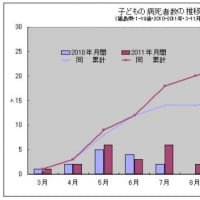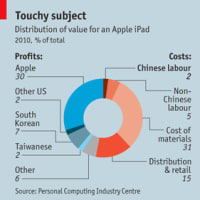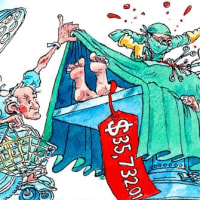
そんなにコロコロ雰囲気が変わって良いもんかどうか、って感じなんですが、
TIMEの記事では
Europe's Recovery: Light at the End of the Tunnel?
In euro-zone powerhouse Germany, industrial orders jumped by 3.2% in June, more than twice the rate analysts had expected. Last month, the Economic Sentiment Indicator — which measures euro-zone confidence in the economic outlook — rose to the highest in more than two years.
6月のGDPの数字が3.2%成長と良くて、予想を2倍も上回っていた。ユーロ圏経済信頼感指数もこの2年で最高。
"I'm surprised by how rapidly the euro zone has stabilized," says Karel Lannoo, CEO at the Centre for European Policy Studies, a Brussels-based think tank. "In May, I was very pessimistic about the euro zone.
ユーロ圏が急速に安定化して驚いている。5月にはとても悲観していたんだが。
で、どうやねん、と言っても、TIMEの記事じゃわからないんで、例によってエコノミストを読むわけですな。
Turbocharged Germany
The success of the euro-area’s largest economy owed a lot to a surge in exports (much of it to emerging markets) and to investment by firms at home looking to upgrade and expand their capital stock to meet that demand. Germany’s talent for bespoke engineering and sleek cars fits well with the needs of fast-industrialising countries and their new middle classes.
ユーロ圏の成功は大きくは、輸出の増加と、需要増加に対応するための新規や更新の資本投資によっている。ドイツの特別仕様に対するエンジニアリング能力やかっこいい自動車は、新興国やそのミドルクラスの需要にとてもフィットしている。
China is a prized customer for the German firms that supply kit for power plants and other infrastructure projects. Small producers of niche capital goods have also seen a surge in orders. German cars have been selling well to affluent consumers in emerging markets. Sales of luxury Mercedes cars to China tripled in the year to July. Sales to India more than doubled. Other carmakers, such as VW and BMW, have prospered too.
中国はドイツの発電所やその他のインフラプロジェクトのサプライヤーにとって重要な顧客だ。小規模でニッチな資本投資分野でも受注は伸びている。ドイツの自動車は新興国の富裕層によく売れている。メルセデスベンツは7月までで売上が3倍。インドは2倍以上だ。フォルクスワーゲンやBMも同じく調子良い。
This surge in new business has been good for jobs. Unemployment in Germany has been steadily falling, in contrast to the trend in the rest of the euro zone—and America. Firms used a short-time working scheme and flexible hours to keep hold of workers when demand was weak. Many of the workers whose hours were cut have been drawn back into full-time work far more quickly than firms had dared hope. Unemployment in Germany is now lower than it was when the crisis began.
雇用にも良い影響があって、これまでドイツの雇用は落ち続けてきてて、企業は需要が小さいときは短時間雇用制度を使って、雇用を維持しているが、時間を削られていた労働者は、良くなかった時期よりフルタイムにずっと早く戻っている。ドイツの失業率は危機が始まった時よりずっと低い。
とまあ、こんな感じです。とってもわかりやすいですな。TIMEの記事は上っ面をなでただけで、最後までよんでも良くわからない。このエコノミストの短い記事の内容を、他の雑誌が書くときはスペシャルとして取り組んだ時くらいですかな。
と、ひたすらよいしょしても、何かもらえるわけじゃないんですが。
さて、ユーロ圏の好調には、ユーロ安が絡んでいることも間違いないでしょうな。
野口教授がその著書で、日本の2000年代前半の好調は円安と金融緩和のポリシーミックスのバブルで本物じゃない、みたいなことを書かれてますが、ユーロ圏も同じかもですね。米国も輸出増加をめざしてて、ドル安は願ったりなんでしょうな。
ニセもんでも、なんでも良いから、景気を回復させろ、というのが、本当のところなんで。
てか、にせもんってナニ?
エコノミストの記事にはグラフが出てて、画像ではっときましたが、やはりギリシャやポルトガル、スペイン、イタリーは厳しいですな。厳しいっても、ギリシア以外は、日本並みかちょい上ってとこですか。
世界経済が回復するなか、なぜ日本だけが取り残されるのか 野口 悠紀雄
TIMEの記事では
Europe's Recovery: Light at the End of the Tunnel?
In euro-zone powerhouse Germany, industrial orders jumped by 3.2% in June, more than twice the rate analysts had expected. Last month, the Economic Sentiment Indicator — which measures euro-zone confidence in the economic outlook — rose to the highest in more than two years.
6月のGDPの数字が3.2%成長と良くて、予想を2倍も上回っていた。ユーロ圏経済信頼感指数もこの2年で最高。
"I'm surprised by how rapidly the euro zone has stabilized," says Karel Lannoo, CEO at the Centre for European Policy Studies, a Brussels-based think tank. "In May, I was very pessimistic about the euro zone.
ユーロ圏が急速に安定化して驚いている。5月にはとても悲観していたんだが。
で、どうやねん、と言っても、TIMEの記事じゃわからないんで、例によってエコノミストを読むわけですな。
Turbocharged Germany
The success of the euro-area’s largest economy owed a lot to a surge in exports (much of it to emerging markets) and to investment by firms at home looking to upgrade and expand their capital stock to meet that demand. Germany’s talent for bespoke engineering and sleek cars fits well with the needs of fast-industrialising countries and their new middle classes.
ユーロ圏の成功は大きくは、輸出の増加と、需要増加に対応するための新規や更新の資本投資によっている。ドイツの特別仕様に対するエンジニアリング能力やかっこいい自動車は、新興国やそのミドルクラスの需要にとてもフィットしている。
China is a prized customer for the German firms that supply kit for power plants and other infrastructure projects. Small producers of niche capital goods have also seen a surge in orders. German cars have been selling well to affluent consumers in emerging markets. Sales of luxury Mercedes cars to China tripled in the year to July. Sales to India more than doubled. Other carmakers, such as VW and BMW, have prospered too.
中国はドイツの発電所やその他のインフラプロジェクトのサプライヤーにとって重要な顧客だ。小規模でニッチな資本投資分野でも受注は伸びている。ドイツの自動車は新興国の富裕層によく売れている。メルセデスベンツは7月までで売上が3倍。インドは2倍以上だ。フォルクスワーゲンやBMも同じく調子良い。
This surge in new business has been good for jobs. Unemployment in Germany has been steadily falling, in contrast to the trend in the rest of the euro zone—and America. Firms used a short-time working scheme and flexible hours to keep hold of workers when demand was weak. Many of the workers whose hours were cut have been drawn back into full-time work far more quickly than firms had dared hope. Unemployment in Germany is now lower than it was when the crisis began.
雇用にも良い影響があって、これまでドイツの雇用は落ち続けてきてて、企業は需要が小さいときは短時間雇用制度を使って、雇用を維持しているが、時間を削られていた労働者は、良くなかった時期よりフルタイムにずっと早く戻っている。ドイツの失業率は危機が始まった時よりずっと低い。
とまあ、こんな感じです。とってもわかりやすいですな。TIMEの記事は上っ面をなでただけで、最後までよんでも良くわからない。このエコノミストの短い記事の内容を、他の雑誌が書くときはスペシャルとして取り組んだ時くらいですかな。
と、ひたすらよいしょしても、何かもらえるわけじゃないんですが。
さて、ユーロ圏の好調には、ユーロ安が絡んでいることも間違いないでしょうな。
野口教授がその著書で、日本の2000年代前半の好調は円安と金融緩和のポリシーミックスのバブルで本物じゃない、みたいなことを書かれてますが、ユーロ圏も同じかもですね。米国も輸出増加をめざしてて、ドル安は願ったりなんでしょうな。
ニセもんでも、なんでも良いから、景気を回復させろ、というのが、本当のところなんで。
てか、にせもんってナニ?
エコノミストの記事にはグラフが出てて、画像ではっときましたが、やはりギリシャやポルトガル、スペイン、イタリーは厳しいですな。厳しいっても、ギリシア以外は、日本並みかちょい上ってとこですか。
世界経済が回復するなか、なぜ日本だけが取り残されるのか 野口 悠紀雄




















※コメント投稿者のブログIDはブログ作成者のみに通知されます